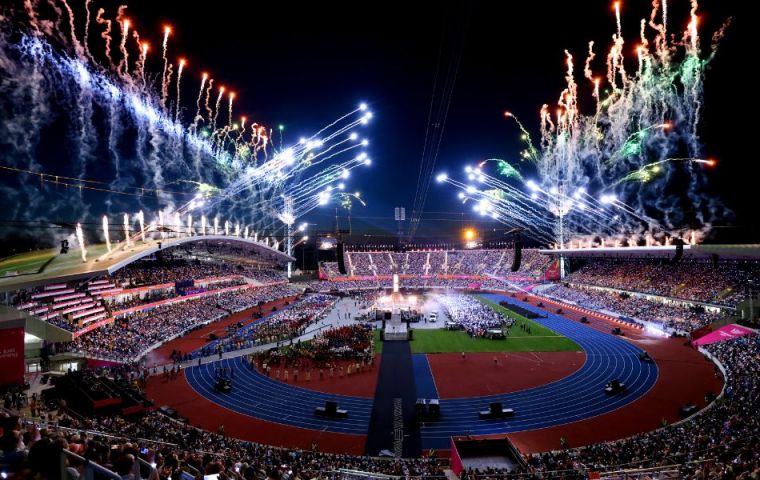MercoPress. South Atlantic News Agency
Commonwealth Games future in doubt: financial benefits clash with a post colonial legacy
 In 2022, the Games were held in the English city of Birmingham, which saw over 5,000 athletes compete for 280 gold medals across 20 sports.
In 2022, the Games were held in the English city of Birmingham, which saw over 5,000 athletes compete for 280 gold medals across 20 sports. The 2026 edition of the Commonwealth Games, are again in trouble with no hosts on sight. In April 2022, the Australian state of Victoria was awarded hosting rights for the 2026 edition, when over 70 nations were expected to participate. But just over a year later, it backed out.
Organizers have not found it easy to find a replacement. Even if the next games go ahead, there are doubts as to whether it can survive into the second half of the century.
Perhaps it is impressive that it has lasted this long. Starting life as the British Empire Games in 1930 and eventually becoming the Commonwealth Games in 1970, the 22nd edition of the event in 2022, held in the English city of Birmingham, saw over 5,000 athletes compete for 280 gold medals across 20 sports.
The 2026 games should have been even bigger, and, certainly, it seemed as if the €900-million (US$ 956-million) bill that Birmingham faced would have been larger in Australia. With costs rising significantly from the initial €1.6 billion, Daniel Andrews, Victoria's state premier, announced the state's withdrawal in July 2023.
It has become a crucial question, how to assess whether the financial benefits of hosting a major sporting event outweigh the costs, and particularly in uncertain economic times, it is not surprising that governments are thinking twice. Only the Scottish city of Glasgow, which hosted in 2014, has shown any public interest in hosting even a slimmed-down version of the competition.
The Games may not be as daunting to stage or expensive as the Olympics but there is a flip-side to that equation. “The Commonwealth Games is much more low-key,” Simon Chadwick, Professor of Sport and Geopolitical Economy at the Skema Business School in Paris said. ”It doesn't offer commercial partners the same level of value, nor does it deliver broadcast audiences of the same magnitude as the Olympics.“
After Australia's withdrawal, Malaysia was offered the chance to stage the Games for the first time since 1998 but refused to do so.
”The answer is pretty obvious, given the current economic climate, the rising cost of living and weak Malaysian Ringgit [currency],“ Haresh Deol, Editor of TwentyTwo13, an independent media organization in Malaysia pointed out that the offer of €117 million in support from the Commonwealth Games Federation was not enough to make a difference. He also cited a lack of time and other sporting priorities as other factors. ”Also, it's barely two years away, and Malaysia has another multi-sporting event that it has to host, the 2027 SEA [Southeast Asia] Games.”
Deol believes that most people supported the decision. “It's safe to say Malaysians would prefer more pressing measures to be addressed. Also, the government did not publicize any justification or information regarding the opportunities from hosting the event.”
Neighboring Singapore performed a feasibility study to determine whether it should step in but decided against it. Gerard Wong, former sports editor of Today newspaper, was not surprised. The Commonwealth Games has to compete with other events that are cheaper, easier to stage, and more prestigious.
“When it comes to staging major events, Singapore authorities are very driven about ensuring a massive bang for their buck,” Wong said. “They gave US rick singer Taylor Swift a grant to stage her concerts here exclusively in March for six nights and hit the jackpot.”
There are no official figures, but it seems that Swift received between US$14 and US$20 million in total for her six concerts, her only shows in Southeast Asia. “All the concerts were 55,000 sell-outs, people were flying in from the region to watch, and hotel rates soared,” added Wong.
According to reports, the concerts in March brought in between US$ 260 to US$ 375 million to the nation. “It's very hard to see the Commonwealth Games being able to do the same to compensate for all the preparations Singapore would have to make for hosting the event,” said Wong. “Just as importantly, we got ourselves in the news in more positive ways.”
While countries such as the United Kingdom, Australia, New Zealand and Canada still seem to see the event as an important part of their sporting calendar, the same can't be said of all Commonwealth members.
“There was a time when competing at the Commonwealth Games was a big deal for Singapore, but I think our targets have changed; we started focusing our ambition more on the Asian Games and the Olympics. In the scheme of things, these two have become more aspirational than the Commonwealth Games.”
“One of the Commonwealth Games' biggest problems is identifying and emphasizing why it exists and what its role is,” said Chadwick. “In a post-colonial world that is pivoting from Global north to Global south, the event seems like an anachronism and out of kilter with the strong sense of national self-identity and pride that many Commonwealth countries now have.”
While many nations of the Commonwealth still have strong links with the United Kingdom, Chadwick sees a need for change. “It carries with it associations with colonialism, oppression, and enslavement,” he said, adding that it needs rebranding and repackaging if there is to be any survival.




Top Comments
Disclaimer & comment rulesCommenting for this story is now closed.
If you have a Facebook account, become a fan and comment on our Facebook Page!